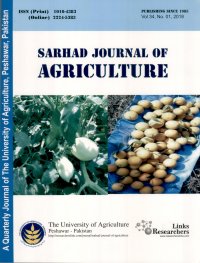Farmers' Knowledge Level Regarding Climate Smart Agricultural Production Technologies in Central Plain Valley of Khyber Pakhtunkhwa
Farmers' Knowledge Level Regarding Climate Smart Agricultural Production Technologies in Central Plain Valley of Khyber Pakhtunkhwa
Arshad Farooq1, Abdul Hassan1, Muhammad Ishaq2, Asif Nawaz3*, Iltaf Ullah4 and Hidayatullah5
ABSTRACT
Pakistan agriculture sector is considered as more susceptible to climate change as its variation can directly affect the crop productivity. Therefore, knowledge about climate smart agricultural production technology is the main component and knowledge gap is at the crux of yield gap. The current study was carried out in two districts Charsadda and Nowshera of Khyber Pakhtunkhwa province during 2020 with main objectives to measure farmers’ knowledge level in fourteen climate smart recommended agricultural production technologies. The data were collected randomly from 60 sample respondents comprised of 30 respondents each from Charsadda and Nowshera districts through pre-tested interview schedule. The empirical results indicated that majority (68%) farmers of both districts had medium knowledge level (35.19%). The lowest knowledge level of the sample farmers was found in early maturity (short duration) maize (OPVs) varieties (26.67%), IPM techniques (25.84%), wheat on ridges/seedbed (24.17%), heat and drought tolerant maize (OPVs) varieties (20.84%), heat and drought tolerant wheat varieties (20%) and organic farming (16.67%). Knowledge index revealed that both districts’ farmers had 35.71% knowledge level in fourteen different indicators in the study area. The farmers of district Charsadda had slightly high knowledge level (38.67%) compared to district Nowshera farmers (32.75%). Results of regression model showed that land holdings, formal education, agricultural extension department contact, and farm services centers membership had positive and substantial effect on knowledge level of farmers. Lack of improved knowledge, lack of financial power, irrigation problems and high cost of inputs were the most important problems faced by the farmers. Agricultural departments need to develop and disseminate climate smart recommended agricultural production technologies. The government and private organizations should arrange trainings and awareness programs regarding climate change to overcome the effect on agriculture.
To share on other social networks, click on any share button. What are these?







